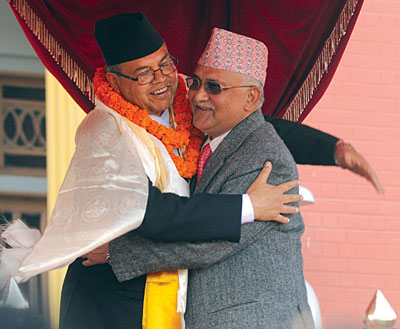 BIKRAM RAI |
The extended deadline to draft the new constitution � 28 May � is drawing closer. The signals coming out of the Constituent Assembly remain mixed at best. It is being held hostage by the three big political parties, roiled as they are by internal feuds and their fear of the future.
A beleaguered Prime Minister Jhala Nath Khanal is struggling to give shape to his cabinet a month after he took oath of office. Two of his party rivals, Madhav Kumar Nepal and KP Oli, are acting on vendetta rather than principle over the secret seven-point deal between Khanal and Maoist Chairman Pushpa Kamal Dahal.
But if Nepal and Oli get their own men into the other plum ministries, you won't hear them utter the words 'Home ministry'. UML has played true to its character over the seven-point agreement; did they reject it in the end or accept it? No one really knows. The brouhaha over the Home Ministry is deliberate, allowing both the Maoists and UML to divert attention from the appalling secret deal.
Certain sections of the media and its commentators have abetted them in this exercise. They have glossed over the deal, besides conveniently ignoring the fact that Khanal has already named two 'losers' to his cabinet from his own party (an insult these commentators often applied to Madhav Kumar Nepal and his cabinet). Such brazen partisanship suits party cadre; not those who claim to be non-partisan.
The Maoists look like acquiring all the trappings of a normal parliamentary party. This could be good or bad, depending on who you are. For the romantics and the Robin Hooders, the feud within the party knocks it off its pedestal. For the realists, this is business as usual. Open feuds and personality clashes are a given in any political party. So those wishing to see the Maoists as a transformed party, take heart.
Nepali Congress, in the meantime, has gone back to reacting rather than leading the way. As academic Krishna Khanal has noted, this is what it has done for most of the post-2006 period. Since making the mistake of ignoring Dahal's overtures on the peace process and power-sharing, the party has been trying to figure out how to reclaim pole position in the affairs of the country.
These intra- and inter-feuds mean that the Constituent Assembly will continue to remain hostage to the whims of the Maoists, Nepali Congress, and UML. With the extended deadline to complete constitution writing less than three months away, and no reliable evidence to suggest that the constitution will materialise by then, what comes next is uppermost.
How will the unspoken part of the Dahal-Khanal deal, to extend the Constituent Assembly by a year again, fare? The much debated Supreme Court interpretation of its order on the last extension of the assembly could be used as an excuse by the two main communist parties. With Upendra Yadav's Forum and other small parties, they could muster a two-thirds majority to amend the Interim Constitution to give the assembly yet another extension.
But as I have argued before in this space, another extension for the assembly, which was elected in May 2008 for a two-year term to draft the constitution, will be justified only if the political parties 1) move decisively towards finding a solution to integration/rehabilitation of Maoist combatants, and 2) show some tangible signs of narrowing their differences on certain constitutional issues.
We are waiting.
READ ALSO:
Death of a statesman, EDITORIAL
Re-engagement, PRASHANT JHA



